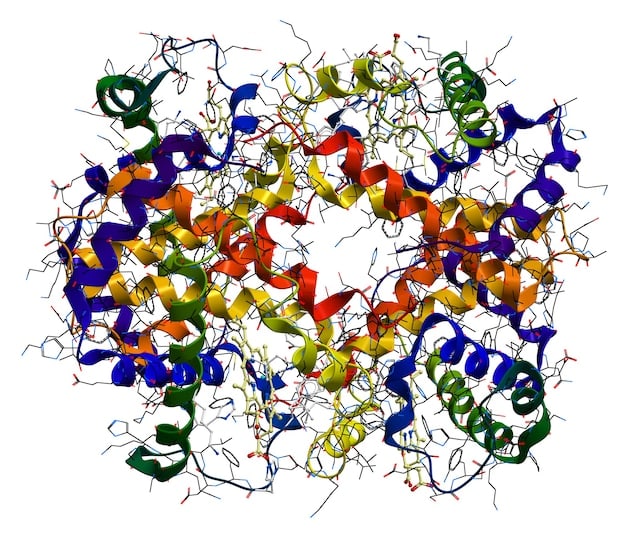Personalized Medicine: Genetic Testing for Improved Cancer Treatment

Personalized medicine, powered by genetic testing, revolutionizes cancer treatment by tailoring therapies to an individual’s unique genetic makeup, promising enhanced efficacy and reduced side effects for patients.
In the relentless fight against cancer, a paradigm shift is underway, moving from a one-size-fits-all approach to highly individualized strategies. Central to this evolution is the concept of personalized medicine: how can genetic testing improve treatment outcomes for cancer patients? This field harnesses the power of an individual’s unique genetic blueprint to optimize therapeutic interventions, promising a future where cancer treatment is not just effective but also precisely tailored.
The Dawn of Personalized Medicine in Oncology
For decades, cancer treatment largely followed standardized protocols, often leading to varying degrees of success and significant side effects. The advent of personalized medicine, particularly within oncology, marks a pivotal departure from this broad-brush approach. It acknowledges that each cancer is as unique as the patient it affects, driven by specific genetic alterations that can influence disease progression and response to therapy.
This individualized strategy is fundamentally reshaping how clinicians approach diagnosis, prognosis, and treatment selection. By embracing the molecular intricacies of a tumor and the host, personalized medicine aims to deliver therapies that are not only more potent but also less toxic, moving toward precision oncology.
Understanding Genetic Testing’s Role
Genetic testing in oncology goes beyond identifying inherited cancer risks; it primarily focuses on somatic mutations—changes that occur in a tumor’s DNA during a person’s lifetime. These tests analyze a patient’s tumor tissue, peripheral blood, or other bodily fluids to detect specific genes, mutations, or biomarkers that can predict treatment response or disease aggressiveness.
- Biomarker Identification: Genetic testing pinpoints specific molecular markers that serve as targets for certain drugs.
- Treatment Selection: Results guide oncologists in choosing treatments most likely to be effective, avoiding ineffective ones.
- Minimizing Side Effects: By avoiding ineffective therapies, patients can bypass unnecessary toxicity.
The insights gained from these tests are critical, transforming ambiguous treatment pathways into clear, data-driven decisions that directly impact a patient’s journey and potential for recovery.
The integration of sophisticated genomic sequencing technologies has made it possible to rapidly and comprehensively profile tumors. This capability provides oncologists with an unprecedented level of detail about the genetic landscape of a patient’s cancer, paving the way for truly bespoke therapeutic regimens. It’s a testament to how far medical science has advanced, offering renewed hope for patients facing difficult diagnoses.
Unraveling the Genetic Landscape of Tumors
The core principle behind personalized medicine in cancer treatment lies in understanding that cancer is fundamentally a disease of the genome. Each tumor harbors a unique set of genetic alterations—mutations, amplifications, deletions, or rearrangements—that drive its growth, survival, and metastatic potential. Identifying these specific alterations is paramount to selecting the most effective targeted therapies.
Comprehensive genomic profiling (CGP) is a powerful tool in this endeavor. It examines hundreds to thousands of genes simultaneously, providing a holistic view of the tumor’s genetic makeup. This is a significant leap from traditional single-gene tests, which often miss crucial actionable mutations that could guide treatment.
Types of Genetic Alterations and Their Impact
Genetic alterations can manifest in various forms, each with distinct implications for cancer behavior and therapeutic vulnerability. Understanding these classifications helps in tailoring treatments effectively.
- Point Mutations: Single nucleotide changes in DNA that can alter protein function, making them susceptible to specific inhibitors (e.g., EGFR mutations in lung cancer).
- Gene Amplifications: Increased copy numbers of certain genes, leading to overexpression of oncogenes, which can be targeted (e.g., HER2 amplification in breast cancer).
- Gene Fusions: Chromosomal translocations that create hybrid genes, often producing oncogenic proteins (e.g., ALK fusions in lung cancer).
Insights from CGP enable oncologists to move beyond organ-specific treatments, embracing a more biologically informed approach. For instance, a drug approved for a specific mutation in one cancer type might also be effective in a different cancer type if it harbors the same actionable mutation.
The complexity of the tumor genome necessitates advanced analytical techniques to interpret the vast amount of data generated. Bioinformaticians play a crucial role in sifting through this genetic information, identifying relevant abnormalities, and translating them into actionable clinical insights. This interdisciplinary effort is what makes personalized oncology a reality.
Precision Targeted Therapies: Matching Drugs to Genes
One of the most profound impacts of genetic testing in personalized medicine is its ability to facilitate the use of precision targeted therapies. Unlike conventional chemotherapy, which broadly attacks rapidly dividing cells, targeted therapies are designed to specifically interfere with molecular pathways crucial for cancer growth and progression, often based on identified genetic aberrations. This specificity leads to higher efficacy and fewer off-target side effects.
The development of these therapies is closely tied to our deepening understanding of tumor biology. Each targeted drug is often developed to inhibit a specific protein or pathway that is overactive or mutated in cancer cells.
Examples of Successful Targeted Therapies
Numerous examples illustrate the transformative power of matching drugs to genes, revolutionizing patient outcomes in specific cancer types.
- HER2-Positive Breast Cancer: Trastuzumab (Herceptin) targets the HER2 protein, which is overexpressed in about 15-20% of breast cancers. Genetic testing for HER2 amplification guides its use, significantly improving survival rates.
- EGFR-Mutated Lung Cancer: Tyrosine kinase inhibitors (TKIs) like Gefitinib or Erlotinib are highly effective in non-small cell lung cancer patients with specific EGFR mutations, offering a superior alternative to chemotherapy.
- BRAF-Mutated Melanoma: Vemurafenib and Dabrafenib specifically inhibit the mutated BRAF protein, leading to remarkable responses in patients with this common melanoma mutation.
These breakthroughs highlight the importance of genetic testing not just for guiding initial treatment but also for monitoring disease progression and identifying mechanisms of resistance, allowing for subsequent therapy adjustments.
The landscape of targeted therapies is continuously expanding, with new drugs being developed and approved at a rapid pace. This dynamic field requires oncologists to stay abreast of the latest genetic discoveries and therapeutic options, ensuring that patients receive the most current and effective personalized treatments available. The collaborative efforts of researchers, clinicians, and pharmaceutical companies are driving this progress forward.

Overcoming Drug Resistance: A Dynamic Approach
While targeted therapies have revolutionized cancer treatment, a significant challenge remains: the development of drug resistance. Cancer cells are highly adaptable, and over time, tumors can acquire new mutations or activate alternative pathways that allow them to bypass the effects of a targeted drug, leading to disease progression. This dynamic nature necessitates a proactive and adaptive treatment strategy.
Genetic testing plays a crucial role in identifying these resistance mechanisms. Liquid biopsies, which analyze circulating tumor DNA (ctDNA) from a simple blood sample, allow for non-invasive and serial monitoring of tumor evolution, detecting emergent resistance mutations long before they manifest clinically.
Strategies to Combat Resistance
Understanding the molecular basis of resistance enables the development of strategies to overcome it, ensuring continued treatment efficacy.
- Second-Generation Inhibitors: Developing new drugs that can inhibit drug-resistant mutations (e.g., Osimertinib for EGFR T790M resistance in lung cancer).
- Combination Therapies: Employing multiple targeted drugs simultaneously to block various pathways, making it harder for cancer cells to escape.
- Sequential Therapies: Adapting treatment regimens based on newly identified resistance mutations, switching to a different targeted therapy or conventional treatment.
The ability to track tumor evolution in real-time through repeated genetic testing allows oncologists to adjust treatment plans dynamically, keeping pace with the cancer’s adaptive strategies. This personalized and dynamic approach is key to extending the benefits of targeted therapies and improving long-term outcomes.
Furthermore, research into the complex molecular mechanisms of resistance is ongoing, leading to the discovery of novel therapeutic targets and innovative drug combinations. The goal is to stay one step ahead of the cancer, ensuring that patients continue to have effective treatment options even after initial resistance emerges. This iterative process of testing, treating, and re-testing is fundamental to modern personalized oncology.
Challenges and Future Directions in Personalized Oncology
Despite the remarkable progress, the widespread implementation of personalized medicine in oncology faces several challenges. These include the high cost of genetic testing and targeted therapies, the complexity of interpreting genomic data, the need for specialized infrastructure, and ensuring equitable access for all patients.
Another hurdle is the identification of suitable biomarkers for all cancer types and patients. While some cancers have well-defined actionable mutations, others remain genetically elusive, requiring further research into novel targets and treatment strategies.
Innovations Shaping the Future
The field is continuously evolving, with exciting innovations poised to further enhance the impact of personalized medicine.
- Artificial Intelligence and Machine Learning: These technologies are being deployed to analyze vast genomic datasets, identify patterns, and predict treatment responses more accurately.
- Single-Cell Sequencing: Provides unprecedented resolution by analyzing the genetic changes in individual cancer cells, revealing tumor heterogeneity that bulk sequencing might miss.
- Immunogenomics: Combining genetic insights with immunotherapy approaches to identify patients most likely to respond to immune checkpoint inhibitors and engineer more effective cellular therapies.
The future of personalized oncology is bright, promising even more precise and effective treatments. Collaborative efforts among researchers, clinicians, technology developers, and policymakers are crucial to overcome current limitations and ensure that the benefits of personalized medicine reach every cancer patient.
Ultimately, the goal is to integrate all available data—genomic, proteomic, clinical, and lifestyle—to create a comprehensive, predictive model for each patient. This holistic approach will allow for truly individualized treatment plans, moving towards a future where cancer is managed as a chronic disease or, ideally, cured, with minimal impact on patients’ quality of life.

The Patient’s Journey: Navigating Personalized Treatment
For cancer patients, embarking on a personalized medicine journey often begins with a diagnosis followed by recommendations for genetic testing. This process can be overwhelming, necessitating clear communication and robust support systems. Understanding what to expect from genetic testing, how results inform treatment decisions, and the potential implications is crucial for patient empowerment.
The results of genetic tests are typically reviewed by a molecular tumor board—a multidisciplinary team of oncologists, pathologists, geneticists, and bioinformaticians—who collectively interpret the findings and recommend the most appropriate personalized treatment strategy. This collaborative approach ensures that every aspect of the patient’s unique genomic profile is considered.
Empowering Patients Through Information
Active patient participation and informed decision-making are cornerstones of personalized medicine. Patients are increasingly encouraged to understand their genetic reports and discuss treatment options with their healthcare team.
- Genetic Counseling: Provides individuals and families with information about genetic testing, results, and implications, offering essential emotional support.
- Patient Education Resources: Easily understandable materials, workshops, and online platforms help patients grasp complex genetic concepts and treatment rationale.
- Shared Decision-Making: Oncologists engage patients in discussions about treatment options, including the pros and cons of targeted therapies, considering their values and preferences.
Coping with cancer is a profound personal challenge, and personalized medicine, while offering hope, also introduces new layers of complexity. Therefore, comprehensive patient support services, including psychological support, nutritional advice, and complementary therapies, are vital components of a holistic personalized care plan.
The patient’s journey through personalized treatment is not linear; it often involves ongoing monitoring, potential adjustments to therapy as the cancer evolves, and continuous engagement with their care team. This dynamic interaction ensures that the treatment remains aligned with the changing needs of the patient and the evolving understanding of their disease, fostering a proactive and hopeful approach to cancer management.
| Key Point | Brief Description |
|---|---|
| 🧬 Genetic Insight | Understanding tumor’s unique genetic alterations for tailored therapy. |
| 🎯 Targeted Therapy | Matching specific drugs to genetic mutations for precise treatment. |
| 🔄 Resistance Management | Using liquid biopsies to adapt treatment as cancer evolves. |
| 💡 Future Horizons | AI, single-cell sequencing, and immunogenomics shaping next-gen treatments. |
Frequently Asked Questions About Personalized Medicine and Cancer
▼
Personalized medicine in cancer involves tailoring medical treatment to each patient’s individual characteristics, including their unique genetic makeup and the genetic profile of their tumor. This approach aims to maximize efficacy while minimizing adverse effects by selecting therapies most likely to work for that specific person.
▼
Genetic testing identifies specific mutations, amplifications, or fusions in a patient’s tumor DNA. These findings guide oncologists in selecting targeted therapies that directly attack these genetic alterations. This precision can lead to higher response rates, prolonged progression-free survival, and reduced side effects compared to standard treatments.
▼
No, while germline genetic testing identifies inherited cancer risks, in personalized oncology, the focus is often on somatic genetic testing. This type of testing analyzes mutations acquired by the tumor cells themselves, which are crucial for determining appropriate targeted therapies and understanding tumor behavior.
▼
Liquid biopsies are non-invasive tests that detect fragments of tumor DNA circulating in the blood (ctDNA). They allow for real-time monitoring of tumor evolution, including the emergence of drug resistance mutations. This allows oncologists to adjust treatments dynamically, ensuring patients receive the most effective therapy as their cancer changes.
▼
Key challenges include the high cost of comprehensive genetic profiling and targeted drugs, the complexity of interpreting genetic data, ensuring specialized infrastructure for testing and analysis, and equitable access to these advanced treatments. Ongoing research is addressing these hurdles to make personalized oncology broadly available.
Conclusion
Personalized medicine, powered by the incredible advancements in genetic testing, is undeniably transforming the landscape of cancer treatment. By illuminating the unique genetic blueprints of each tumor and patient, it enables the selection of therapies that are not only more precise and effective but also significantly less toxic. While challenges remain, the continuous evolution of genomic technologies, coupled with innovative therapeutic strategies and a growing understanding of tumor biology, promises a future where cancer care is truly individualized, offering new hope and improved outcomes for patients worldwide. The journey towards fully realized personalized oncology is an ongoing testament to scientific ingenuity and dedication to eradicating this complex disease.





